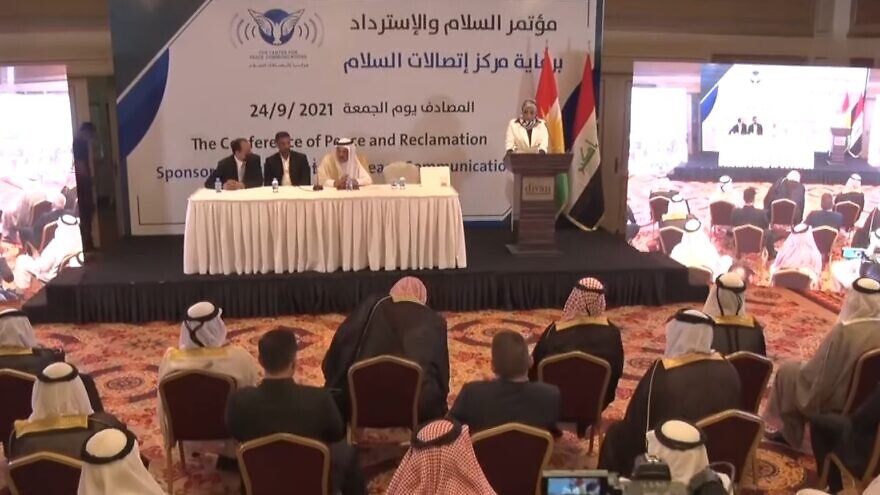Edited by: Fern Sidman
On September 24th, some 300 Shiites and Sunni Kurds gathered for an unprecedented conference calling for peace with Israel and a normalization in relations in the Kurdish regional capital of Erbit in Iraq. Tribal elders and youth leaders also participated in the conference.
The conference was organized by the New York based Center for Peace Communications and strives to “build public support for reconciliation” according to its web site. The conference ended with a call for Iraq to join the Abraham Accords.
According to the MEMRI video of the conference, the speaker calls for the rejection of terrorism, honors the memory of the six million Jews slaughtered during the Holocaust, acknowledges Israel as a powerful country and one that should be pursued in the name of peace and reminds us that a half a million Israelis are of Iraqi origin. She then calls for Iraq to join the international community and rejects isolationism in all its forms.
Israeli Prime Minister Naftali Bennett praised the gathering, but Iraq’s federal government called the conference “illegal” and labeled the participants as “traitors.”
Subsequent to the conference, Bennett tweeted: “Hundreds of Iraqi public figures, Sunnis and Shiites, gathered to call for peace with Israel. This is a call that comes from below and not from above, from the people and not from the government, and the recognition of the historical injustice done to the Jews of Iraq is especially important. Israel extends its hand back in peace.”
In a Wall Street Journal commentary, another conference participant, Sheikh Wisam Al-Hardan, made the case for Israeli-Iraqi ties.
“We demand that Iraq join the Abraham Accords internationally,” wrote Al-Hardan, leader of the Sons of Iraq Awakening movement. “We call for full diplomatic relations with Israel and a new policy of mutual development and prosperity.”
“Some of us have faced down ISIS and al-Qaeda on the battlefield,” he added. “Through blood and tears we have long demonstrated that we oppose all extremists, whether Sunni jihadists or Iran-backed Shi’ite militias. We have also demonstrated our patriotism: We sacrificed lives for the sake of a unified Iraq, aspiring to realize a federal system of government as stipulated in our nation’s constitution.”
In his WSJ article, Al Harden acknowledged the tragedy of Iraqi Jews, a 2,600-year-old community that numbered more than 100,000 persons, that was driven out of the country by anti-Semitic riots and hatred, according to a Jewish News Syndicate (JNS) op-ed written by Jonathan Tobin.
The New York Times reported that the backlash against the conference, which was attended by former U.S. State Department official Dennis Ross, was intense and as such, the Iraqi government issued arrest warrants for six of the participants.
Tobin writes: “Others were fired from their government jobs. Pictures of the six—now wanted by the authorities for advocating peace with Israel—are now featured on huge banners erected at checkpoints between Anbar and Baghdad with the captions accusing them of “treason.”
It was also reported that the office of Iraqi President Barham Saleh, who is also Kurdish, also censured the conference.
After being threatened for directly advocating that Iraq join the Abraham Accords and for speaking of a desire for reconciliation between Jews and Arabs, Al-Harden completely recanted his position, as was reported by Tobin. He writes: “The sheikh said he was deceived by the conference organizers and that he did not write the speech he gave at the conference or the Wall Street Journal article, claiming that since he does not read or write English, he had no idea what was being published in his own name.”
Tobin adds in his JNS piece: “The conference organizer, Joseph Braude, an Arabic-speaking American of Iraqi Jewish descent, insists that the sheikh understood everything that was in the article and his speech. Al-Harden’s son, who did not attend the conference but did drop his father off there, is also facing an arrest warrant if he returns to Anbar. Conference attendees are remaining in Erbil, which is part of the autonomous Kurdish region that broke away from Baghdad’s control decades ago. But they know if they go home, they may die.”





